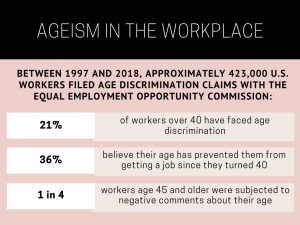Getting older can come with a lot of annoyances. Health issues start popping up, your body might ache (remember being able to sit on the floor and then get up with no problems?), your vision and hearing might not be what they used to be, and food doesn’t even taste as good as it used to. Not fair, right? And beyond what is happening with your body, there might be other issues that make your life feel a bit altered as you age: you might actually find that people treat you differently.
Sometimes – and hopefully – that means getting the respect you deserve for the wisdom and experience of your years, but often, and unfortunately, it can actually mean being dismissed or considered “past it.” Maybe it’s your grandchildren laughing at the way you interact with technology, maybe it’s having to swallow all those negative stereotypes of older adults in the media that are just meant to be “funny” – or maybe it’s even worse than that. You might start encountering all sorts of little microaggressions, but you might also be facing even bigger forms of discrimination, from employment discrimination to biases when you access healthcare, to being made to feel invisible in society.
All of this can build up and take its toll on you, leading to worse mental and physical health. So how is ageism, this last “acceptable” form of discrimination, affecting older adults – and are there ways to change things? Some interesting studies are taking a look at how much of a threat ageism is to senior citizens and questioning what we all need to do about it.
What Is Ageism?
The World Health Organization (WHO), which has recently been attempting to highlight the damaging effects of ageism, defines it as defines it as “stereotyping, prejudice and discrimination” based on age. They are extremely concerned at how woven into the fabric of societies all around the world it is, and how much it can affect older people. In fact, they point out that, according to a United Nations report on ageism, “Every second person in the world is believed to hold ageist attitudes – leading to poorer physical and mental health and reduced quality of life for older persons, costing societies billions of dollars each year.”
We tend to think about ageism as a workplace problem, and there is definitely some truth to that. In fact, between 1997 and 2018, approximately 423,000 U.S. workers filed age discrimination claims with the Equal Employment Opportunity Commission, making up 22% of all workplace discrimination claims. Not only that, but more than 21% of surveyed workers over 40 have faced age discrimination, 36% believe their age has prevented them from getting a job since they turned 40, and nearly 1 in 4 workers age 45 and older have been subjected to negative comments about their age from supervisors or coworkers.
But ageism doesn’t stay at the worksite; it’s all around us. In fact, one study in The Gerontologist found that nearly 80% of respondents to a survey reported experiencing ageism, such as other people assuming they had memory or physical impairments due to their age. The survey also revealed that the most frequent type of ageism (reported by 58% of respondents) was being told a joke making fun of older people, and 31% reported being ignored or not taken seriously because of their age.
The Effects of Ageism
All of the above ways that ageism remains a part of our society can take a serious toll on older adults. It seeps into so many parts of society, including doctors’ offices, places offering social care, workplaces, the media, and the legal system, and it can end up making life worse for seniors in actual, concrete ways. For example, according to the WHO, a systematic review in 2020 of how healthcare is rationed based on age showed that, in 85% of 149 studies, age determined who received certain medical procedures or treatments.

The WHO points out that “Ageism has serious and wide-ranging consequences for people’s health and well-being. Among older people, ageism is associated with poorer physical and mental health, increased social isolation and loneliness, greater financial insecurity, decreased quality of life, and premature death. An estimated 6.3 million cases of depression globally are estimated to be attributable to ageism.”
The numbers back this up: for example, one 2020 study in the U.S. showed ageism in the form of negative age stereotypes and self-perceptions led to excess annual costs of $63 billion for the eight most expensive health conditions. This amounts to $1 in every $7 spent on these conditions for all Americans over the age of 60 for one year.
In another study, psychologist Becca Levy, PhD, assistant professor of public health at Yale University found that older adults with more positive self-perceptions of aging lived 7.5 years longer than those with negative self-perceptions of aging. She also found that older people who see aging in positive terms are much more likely to recover from disability than those who believe negative age stereotypes. They’re also more likely to practice preventive health measures such as eating well and exercising, and they experience less depression and anxiety.
According to Dr. Levy, “With negative stereotypes, older people have a higher risk of dementia. They have greater accumulations of plaques and tangles in the brain, the biomarkers of Alzheimer’s disease, and a reduced size of the hippocampus [the part of the brain associated with memory].”
Is There a Solution?
These studies all sound pretty dire. In addition, “there’s a lot of social acceptance of ageism,” as Dr. Levy points out, and studies have found that children as young as three or four already hold ageist ideas. With all of this, it can seem like there’s nothing that can be done. But there is also good news: a new study shows that we can change things.
The WHO has invested half a million dollars in research, with teams around the world collecting and assessing all available evidence on ageism, including its causes and health consequences, how to combat it, and how best to measure it. One of the research groups, at Cornell University, spent a year and a half sifting through dozens of articles, from the 1970s through 2018, evaluating anti-ageism programs – and they actually came up with some very positive findings!
In almost all cases, the participants in the anti-ageism programs they looked at showed significantly less ageism on attitude tests and greater knowledge of aging than people who hadn’t taken part. So what kind of programs seem to change attitudes? Some examples included:
- A program in which undergraduate psychology students corresponded with older adults by email, developing deepening relationships over six weeks.
- A gardening project in which fourth-graders went to a senior center twice weekly for a month and worked side-by-side with older adults.
- A four-session program in an Australian high school, incorporating discussions, games and role-playing about aging.

Programs that included intergenerational components, meaning they included contact between younger and older people, as well as education about aging, were particularly effective at changing attitudes. And these programs didn’t have to be major, expensive undertakings: most were small, inexpensive, and local.
Ageism is a problem – it has been for a long time, and it can have extremely negative effects on a big portion of our population. But studies show both that we can change attitudes, and that changing those attitudes can make a big difference in quality of life for older adults. We need to remember, though, that it can also be very hard to combat all of those internalized negative feelings about aging that you might have if you’re a senior, and it can be hard to find a balance between being forced to shrug off offensive messages, and constantly having to fight with the world around you.
But you can speak up about ageism, and you can be an advocate for getting involved in programs that bring different generations together and educate younger people to change minds. The lives and well-being of all older adults might just depend on it! So what do you think? What types of ageism have you encountered, and do you think we can rid ourselves of this last form of “acceptable” discrimination?
